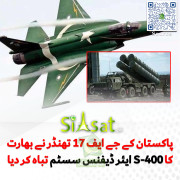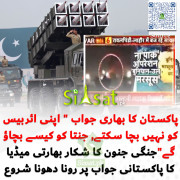
Starting a few months ago, the $24 million import bill for Pakistan's Conductor & Cables, a Lahore-based steel business that employs 300 workers, became a drain on the country's most precious resource—the U.S. dollar. As the global credit crisis has intensified and Pakistan has steadily seen its foreign reserves dwindle, privately held Conductor & Cables is facing its toughest challenge yet. In an attempt to preserve its foreign exchange, the Pakistani government has told importers they must provide for one-third of their import bill in cash before a bank can issue letters of credit. As a result, Chief Executive Muhammad Imran Khan's imports are down by 50%. "My company is in a pretty deep crisis right now," he says. "But so is the country."
This is what it feels like when a country faces bankruptcy. The electricity goes out for as much as 12 hours a day, the gasoline lines get longer, and depositors rush to banks to pull out their meager savings. After weeks of begging in vain for help from the international community, Pakistan's foreign exchange reserves have dropped to just $4.3 billion, down nearly 75% in the past year because of soaring prices for commodities, particularly oil, which accounts for about one-third of imports. The country presently has only enough cash to pay for about 45 days of imports at current rates. And the rupee has lost about 25% so far this year. Unlike Iceland, whose economy collapsed (BusinessWeek.com, 10/9/08) as a direct result of the global credit crunch, Pakistan's problems are largely homegrown. Indeed, its banks are well capitalized and did not get caught up buying fancy debt securities linked to the U.S. housing market.
RAGING INFLATION
Already the country has cut its oil imports so it holds no more than 10 days' supply at any given time. Inflation is raging at more than 24%, and for the first time in a decade, Pakistan's economic growth this year will drop below 5%, according to economists' estimates, compared with 6.5% last year. For the $146 billion economy in Pakistan, a mainstay in the Bush Administration's war on terror, the crisis could not have come at a worse time. Since 2001 the U.S., Pakistan's traditional ally, has given the country as much as $10 billion in military aid.
With the global economic system already in shock, were Pakistan to default on its massive foreign debt obligations—which it has done before—the impact would be painful. At the same time, the West needs Pakistan's newly elected civilian government to remain stable: Pakistan's nuclear arsenal was never completely secure in the best of times, and now, with an increased offensive by the Taliban in Peshawar, the biggest Pakistani city near the border with Afghanistan, Pakistan's role in the global war on terror has never been more important.
With global arteries of credit still constricted, Pakistan's already toxic debt—rated the second-worst in the world by Standard & Poor's—makes it impossible for the country to get bridge loans to make partial payments on outstanding loans. Just this past week, Pakistani President Asif Ali Zardari used his first state visit to China to ask for a loan to Pakistan's central bank, reported by Chinese media to be as large as $2 billion. China said no, but offered to increase bilateral trade and will consider building two nuclear reactors in the country.
HUGE DEBT BURDEN
Pakistan's debt burden is significant. It has nearly $3 billion in commercial foreign debt and $38 billion in concessionary loans from the International Monetary Fund and the Paris Club, an informal lending group of about 20 countries, according to an estimate by Credit Suisse (CS) analyst Farid Khan. Payments on dollar-denominated bonds continue, but in February a $500 million bond comes due, bringing debt servicing costs for 2008 to more than $3 billion, according to a government estimate.
"The option of defaulting on those loans has never even been seriously considered," says Sakib Sherani, chief economist for the Royal Bank of Scotland (RBS) in Pakistan and an adviser to the government. "But even if they don't have the willingness to default, that doesn't mean it couldn't happen."
Just to keep afloat, Pakistan's recently appointed financial adviser to the Prime Minister, Shaukat Tarin, has asked the World Bank, the Asian Development Bank, and other lenders for just under $4 billion in loans.
And then there's the measure of last resort—the International Monetary Fund, which is likely to impose strict tariff reductions in exchange for the loans. It's not a pleasant option for Pakistan, which has tried for decades to be free of the IMF's influence. Already, a team from Pakistan has been meeting with the IMF in Washington. "We don't have the luxury of foreign exchange reserves to prolong negotiations by a few months," says Sherani. "So the closer [Pakistan] gets to running out of foreign exchange, the likelihood of turning to the IMF gets stronger."
IMF: "PLAN C"
Pakistan hopes things don't come to that—newly appointed Finance Minister Shaukat Tarin has referred to the IMF as "Plan C"—and is waiting for a conference later this month in Abu Dhabi with an informal group called the Friends of Pakistan to see if soft loans or delayed oil payments to its Middle Eastern allies could buy it some breathing space.
But the crisis's impact on Pakistan's real economy, which was already reeling from a 60% increase in oil prices since the beginning of the year and inflation at a 30-year high, has been severe. Last year it was the star performer among Asia's indexes, but for now the Karachi Stock Exchange is in complete paralysis. On Aug. 27 the exchange introduced a circuit breaker that prevents prices from falling. Trade, which had already halved by 50% from January to May, to about 150 million shares a day, has dwindled to a few thousand per day.
"We were faced with a problem of sharply depreciating currency. We had investors panicking, very thin volumes, and the market was falling again," say KSE president Adnan Afridi. "So [in August] we put in the much-talked-about floor."
Afridi plans to remove the floor on Oct. 27. Investors are bracing for a nearly 20% drop, and the government is planning to provide a backstop by selling a put option to foreign investors that would limit their downside losses. "In the backdrop of what's happening globally, with local banks under a lot of liquidity pressure, it [was] probably not a bad thing to freeze things for a while," says Credit Suisse's Khan. "But the sooner they remove the planks from beneath the floor and let the market forces determine the fair level, the better it will be."
Inside Pakistan, though, the situation is seen as just another crisis in a year during which Pakistan People's Party leader Benazir Bhutto was assassinated, military dictator Pervez Musharraf resigned, the country's first civilian government in seven years took office, and terrorists have launched major attacks. Says Shamim Ahmed Shamsi, the head of the Lahore Chamber of Commerce: "Basically, what we need is a short-term measure so that things can return to some sort of 'normalcy,' even with a little bit of short-term borrowing."
Restored confidence in the stock market—and the entire economy—may come soon via foreign aid, especially if this economic crisis distracts Pakistan's leaders for too long from the conflict right on its border with Afghanistan. As Zardari never tires of reminding the world, Pakistan is on the front lines of the war on terror. Indeed, U.S. Assistant Secretary of State Richard Boucher arrived in the country over the weekend, and a series of missile and artillery attacks claimed to have killed several insurgents near the border with Afghanistan. "Pakistan really is a problem, but they will definitely get assistance from the U.S. and Europe because of this al Qaeda thing," says Mark Mobius, executive chairman of Templeton Asset Management, who invests exclusively in emerging markets. "I'm not too worried about it."
Srivastava reports for BusinessWeek from New Delhi. Balfour is Asia Correspondent for BusinessWeekbased in Hong Kong.
http://www.businessweek.com/globalbiz/content/oct2008/gb20081020_947596.htm
Article Dated : October 16th, 2008






























